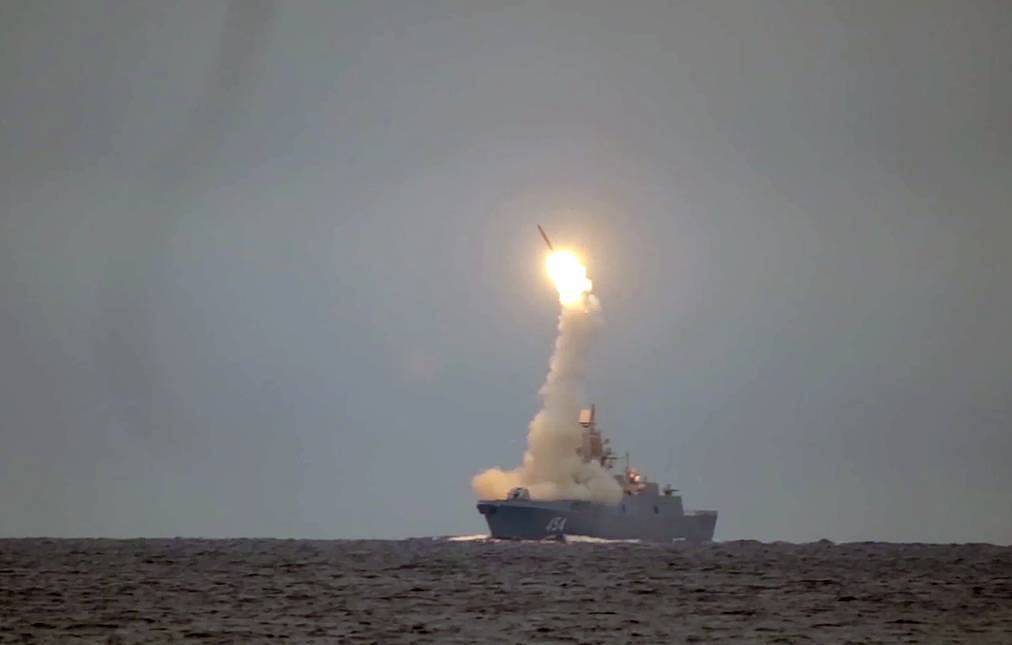The shipborne 3M22 Tsirkon hypersonic missile will be accepted for service in the Russian Navy this year. The missile is mass-produced and frigate Admiral Gorshkov has already received it as its armament. The Tsirkon hypersonic missile was engineered and is produced by the Research and Production Association of Machine-Building based in the town of Reutov in the Moscow Region (part of Tactical Missiles Corporation). The first test-launches of the Tsirkon hypersonic missile from the underwater carrier, the nuclear-powered submarine Severodvinsk. The Russian state-owned news agency Tass reported that the issue of accepting the hypersonic weapon for service is a standard set of procedures is under way to formalize documents on accepting the Tsirkon for service.
The 3M22 Tsirkon (3M22 Zircon, NATO reporting name: SS-N-33) is a scramjet powered maneuvering anti-ship hypersonic cruise missile produced by Russia, for the Russian Navy which has launch platforms on frigates and submarines. The missile represents a further development of the Hypersonic Experimental Flying Vehicle (HELA) developed by NPO Mashinostroyeniya. Tsirkon is believed to be a maneuvering, winged hypersonic cruise missile with a lift-generating center body. A booster stage with solid-fuel engines accelerates it to supersonic speeds, after which a scramjet motor with liquid-fuel in the second stage accelerates it to hypersonic speeds. The missile’s range is estimated to be 135 to 270 nautical miles (155 to 311 mi; 250 to 500 km) at low level, and up to 400 nmi (460 mi; 740 km) in a semi-ballistic trajectory; average range is around 400–450 km (250–280 mi; 220–240 nmi).

The high speed of the Tsirkon likely gives it better target-penetration characteristics than lighter subsonic cruise-missiles, such as Tomahawk. Being twice as heavy and almost eleven times as fast as Tomahawk, the Tsirkon has more than 242 times the on-cruise kinetic energy of a Tomahawk missile (?9 gigajoules, or equal to 2,150 kg TNT explosive energy). Its Mach 9 speed means that it cannot be intercepted by existing missile defence systems and its precision makes it lethal to large targets such as aircraft carriers. Tsirkon can travel at a speed of Mach 9 (6,900 mph; 11,000 km/h; 3.1 km/s). This has led to concerns that it could penetrate existing naval defense systems. Because it flies at hypersonic speeds within the atmosphere, the air pressure in front of it forms a plasma cloud as it moves, absorbing radio waves and making it practically invisible to active radar systems (plasma stealth).
In January 2023 Tsirkon was first deployed on the Admiral Gorshkov-class frigate which is lead ship of the Project 22350 series of frigates. Admiral Nakhimov is currently being modernised and is expected to start sea trials in 2023. The ship’s P-700 Granit anti-ship missiles are being replaced with the 3S14 universal VLS cells capable of carrying the Oniks, Kalibr and Tsirkon anti-ship cruise missiles; the vessel is to be equipped with 72 such missiles. The other active Kirov-class ship, Pyotr Velikiy, will undergo a similar procedure. After completion of their refit, the ships could carry 40–80 anti-ship cruise missiles of different types. Other platforms which will receive Tsirkons are Gremyashchiy-class corvettes (fitted with UKSK VLS cells during their construction), Yasen-class submarines, modernised Udaloy-class destroyers, and modernised Oscar-class submarines (Project 949AM).












